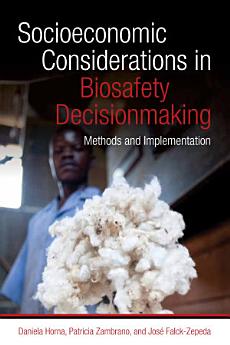Socioeconomic considerations in biosafety decisionmaking: Methods and implementation
About this ebook
The authors identify three crucial steps in making socioeconomic assessment part of a biosafety regulatory process, decisionmaking process, or both. First, select appropriate research tools and methods that yield robust results but that also take into account time and budget constraints. Second, evaluate the institutional setting of GM technology deployment. Third, allow for the uncertainties inherent in the assessment by using ranges of values for the parameters under evaluation, including yield, technology efficiency, and prices. These and other conclusions should provide useful guidance to policymakers and development researchers in countries that opt to incorporate socioeconomic considerations into their biosafety regulations, as well as their decisionmaking process for GM crop approval.
About the author
José Falck-Zepeda ([email protected]) is a senior research fellow in the Environment and Production Technology Division of the International Food Policy Research Institute, Washington, DC, and leader of the polity team in IFPRIs Program for Biosafety Systems. His relevant publications include Estimates and Implications of the Costs of Compliance with Biosafety Regulations in Developing Countries, GM Crops and Food: Biotechnology and Agriculture in the Food Chain 3 (1), coauthored with Jose Yorobe Jr., Bahagiawati Amir Husin, Abraham Manalo, Erna Lokollo, Godfrey Ramon, Patricia Zambrano, and Sutrisno; and Socio-economic Considerations in Biosafety and Biotechnology Decision Making: The Cartagena Protocol and National Biosafety Frameworks, Review of Policy Research 28 (2), coauthored with Patricia Zambrano. Falck-Zepeda is the author of Socio-economic Considerations, Article 26.1 of the Cartagena Protocol on Biosafety: What Are the Issues and What Is at Stake? AgBioForum 12 (1), and coedited, with Melinda Smale, a special issue of AgBioForum: Farmers and Researchers Discovering Biotech Crops: Experiences Measuring Economic Impacts among New Adopters, AgBioForum 15 (2).
Guillaume Gruère ([email protected]) was a senior research fellow in the Environment and Production Technology Division of the International Food Policy Research Institute, Washington, DC. His relevant publications include Refining Opportunity Cost Estimates of Not Adopting GM Cotton: An Application in Seven Sub-Saharan African Countries, Applied Economic Perspectives and Policy 33 (2), coauthored with Antoine Bouët; GM-Free Private Standards and Their Effects on Biosafety Decision-Making in Developing Countries, Food Policy 34 (5), coauthored with Debdatta Sengupta; Will They Stay or Will They Go? The Political Influence of GM-Averse Importing Companies on Biosafety Decision Makers in Africa, American Journal of Agricultural Economics 94 (3), co-authored with Hiroyuki Takeshima.
Daniela Horna ([email protected]) is a freelance researcher in Washington, DC. She was a postdoctoral fellow in the Environment and Production Technology Division of the International Food Policy Research Institute, Washington, DC. Her relevant publications include Farmer Willingness to Pay for Seed-Related Information: Rice Varieties in Nigeria and Benin, Environment and Development Economics 12 (6), coauthored with Melinda Smale and Matthias von Oppen; Insecticide Use on Vegetables in Ghana: Would GM Seed Benefit Farmers? IFPRI Discussion Paper 785, coauthored with Melinda Smale, Ramatu Al-Hassan, José Falck-Zepeda, and Samuel E. Timpo; and Betting on Cotton: Potential Payoffs and Economic Risks of Adopting Transgenic Cotton in West Africa, African Journal of Agricultural and Resource Economics 2 (2), coauthored with José Falck-Zepeda and Melinda Smale.
John Komen ([email protected]) is assistant director and Africa coordinator for the Program for Biosafety Systems of the International Food Policy Research Institute, Washington, DC. His relevant publications include The Emerging International Regulatory Framework for Biotechnology, GM Crops and Food: Biotechnology and Agriculture in the Food Chain 3 (1) and Capacity Development for Agricultural Biotechnology and Biosafety Decision Making: Facilitating Implementation of Confined Field Trials in Uganda, Proceedings of the International Conference on Agro-biotechnology, Biosafety and Seed Systems in Developing Countries, coauthored with Theresa Sengooba. Komen also wrote Capacity Building in Biosafety, coauthored with Karim M. Maredia, Cholani Weebadde, and Kakoli Ghosh; and The Evolving International Regulatory Regime: Impact on Agricultural Development, coauthored with Silvia Salazar; both in Environmental Safety of Genetically Engineered Crops.
Miriam Kyotalimye ([email protected]) is a programme assistant in the Policy Analysis and Advocacy Programme of the Association for Strengthening Agricultural Research in Eastern and Central Africa.
Theresa Sengooba ([email protected]) is the Uganda coordinator for the Program for Biosafety Systems, Kampala. She also worked for Ugandas National Agricultural Research Organisation for 20 years. Her relevant publications include Capacity Development for Agricultural Biotechnology and Biosafety Decision Making: Facilitating Implementation of Confined Field Trials in Uganda, Proceedings of the International Conference on Agro-biotechnology, Biosafety and Seed Systems in Developing Countries, coauthored with John Komen; Biosafety Education Relevant to Genetically Engineered Crops for Academic and Non-academic Stakeholders in East Africa, Electronic Journal of Biotechnology 12 (1), coauthored with Rebecca Grumet et al.; and Developing National Biosafety Systems, Promoting Biosafety and Biosecurity within the Life Sciences: An International Workshop in East Africa.
Patricia Zambrano ([email protected]) is a senior research analyst in the Environment and Production Technology Division of the International Food Policy Research Institute, Washington, DC. Her relevant publications include Unweaving the Threads: The Experiences of Female Farmers with Biotech Cotton in Colombia, coauthored with Melinda Smale, Jorge H. Maldonado, and Sandra L. Mendoza, and A Case of Resistance: Herbicide-Tolerant Soybeans in Bolivia, coauthored with Melinda Smale, Rodrigo Paz-Ybarnegaray, and Willy Fernández-Montaño, both in AgBioForum 15 (2); and The Socio-economic Impact of Transgenic Cotton in Colombia, Biotechnology and Agricultural Development: Transgenic Cotton, Rural Institutions and Resource-Poor Farmers, coauthored with Luz Amparo Fonseca, Iván Cardona, and Eduardo Magalhaes.






